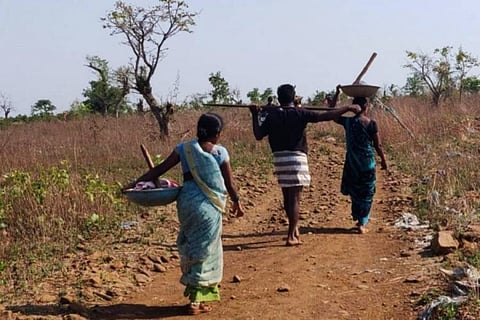

Peddaboori Gangamani, a Dalit resident of Padmajiwadi, Sadashivanagar mandal of Telangana’s Kamareddy district, is confused that while her co-workers from other communities employed under the Mahatma Gandhi National Rural Employment Guarantee Act (MGNREGA) have received full wages, she is yet to receive her wages in full. “My hands are full of blisters because of the work. We had to dig a pit, it was laborious work. But I’m yet to receive the payment for it,” Gangamani recalls. She is an agricultural labourer who depends on MGNREGA work and additionally rolls beedis to make a living.
Gangamani had done MGNREGA work in her village during the months of April, May and June last year, along with two of her family members. However, they collectively earned a mere Rs 2,500. “I have made many rounds to the post office to check if my dues were credited, but to no avail,” Gangamani sighs.
The reason Gangamani’s wages are delayed is because of the controversial policy adopted by the Union Government in March 2021, after which MGNREGA workers were segregated based on caste while making payments. Wages were split into three categories: Scheduled Castes, Scheduled Tribes, and Others. This policy, which was implemented without a discussion in the Parliament, led to several problems at the grassroots level. The primary problem, however, was the delay in the payment of wages, apart from causing tensions between communities.
As per Section 3(3) of the MGNREGA Act, 2005, the wages should be paid within 15 days. But a study conducted by social research group Liberation Technology India, also known as LibTech, found that in Telangana, on an average, the Union government was taking 31 days to make payments to Scheduled Caste workers. Similarly, it was taking 23 days on an average to make payments to Scheduled Tribe workers, 21 days for Backward Classes, and 20 days for other castes. On an average, the Union government was taking 24 days to make payments to Telangana MGNREGA workers, the study found.
For the study, LibTech examined 1.97 lakh financial transactions collected from 138 of 12,769 panchayats. They downloaded details of payments for all the job cards for the current financial year (FY 2021-22) up to January 18, 2022.
Pointing out the drastic delay in payments due to the policy, the study found that the percentage of transactions cleared between 0-7 days in the financial Year 2021-22 is 16.8% whereas it was 66% in 2020-21 and 72.2% in 2019-20.
It must be noted that lakhs of migrant workers who moved back to their native villages have been relying on MGNREGA work as there is an employment crunch due to the prevailing COVID-19 crisis. “Many of my relatives are depending on MGNREGA work to feed their family because they lost their jobs in the city and employment opportunities are rare,” Gangamani shares.
Lamenting her low earnings, she says, “In 2020, we had earned around Rs 8,500 but this year we earned just a quarter of that amount.”
The MGNREGA payment process is done in two stages. After the work is completed, a Fund Transfer Order (FTO) is generated by the state government and digitally sent to the Union Government, which is called Stage 1. The Union government then processes the FTOs and transfers wages directly to the workers’ accounts. This is called Stage 2, which is entirely the Union government’s responsibility. As per the guidelines of the MGNREGA Act, Stage 1 must be completed in eight days and Stage 2 must be completed within seven days. The entire process should be completed within 15 days of closure of a muster of work.
When the policy to split worker payments based on caste was announced, it was opposed by anti-caste activists, who said that the policy defeats the goal of equal work and denies the rights of Scheduled Caste and Scheduled Tribe workers. They had pointed out that the segregation would lead to uncertainty in payments and unnecessarily complicate the process. Renowned economist Jean Drèze slammed the policy as “utterly pointless” as it served no purpose.
After several states, including Karnataka and Tamil Nadu, demanded restoration of the earlier practice, the Union government withdrew the policy in October 2021.
However, this change is not reflecting on the ground yet. “Our engagement with officials has revealed that the changes will reflect only after April, when the financial year comes to an end. Until then the officials cannot make any changes,” said Suguna Bheemarasetti, a researcher at LibTech India who was involved in the study.
LibTech has demanded that the Union government provide compensation for the delay in the payments. “Millions of workers across Telangana and the country are dependent on MGNREGA works for their survival after the outbreak of the COVID-19 pandemic. In this context, it’s the responsibility of the Union government to see that wages are paid on time as per the provisions of the Act,” Suguna said.
The Union government must pay compensation to the workers for the full extent of delays, LibTech said. Para 29 of Schedule II of the MGNREGA Act says that a worker is entitled to payment of compensation at the rate of 0.05% of the unpaid wages per day of delay beyond the sixteenth day of closure of muster roll.